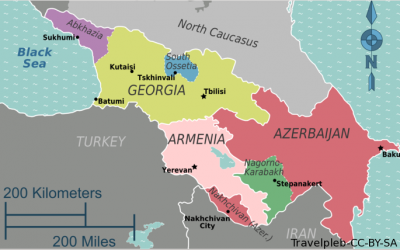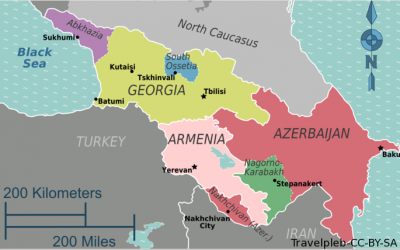As the wait continues for Israeli annexation of perhaps up to one-third of the currently occupied territories west of the Jordan River, a lesson can be drawn by Armenia and the region of Nagorno-Karabakh.

The two dynamics are similar in some aspects yet quite different in others. The Israeli dynamic today is comprised of the Trump-Netanyahu relationship and land captured during the 1967 Six-Day War. The aftermath of that war is well known. The Armenian dynamic is associated with a region on the farthest eastern edge of what is known as the Armenian Highlands, conveniently re-cataloged by Soviet cartographersas part of the Southern Caucasus. Interestingly, both dynamics involved the British, in and around WWI. While the Balfour Declaration generally supported Zionist efforts in Palestine, the British championed (1918-1920 military support, political machinations, broken promises, etc.) Azerbaijani rule over the Armenian-populated region of Nagorno-Karabakh. British backing was somewhat complicated, some of it in reaction to the Ottoman Empire’s dismemberment and associated fear by its Muslim subjects, particularly those in British-administered India. Gandhi was already protesting British rule. British political support for any Muslims helped quell unrest already brewing in the post-Sykes-Picot dismemberment of the Middle East. Besides, with Baku floating in oil, Britain seeking concessions in oil-rich Iraq, London’s open support for demands of both Islamic and Turkish nationalist forces was in their interest, at the expense of the indigenous Armenians of Nagorno-Karabakh.
After 1920, as Sovietization commenced, Turkish nationalist leader Mustafa Kemal, one of the few supporters of Soviet leader Vladimir Lenin, lobbied for a Turkic characterization in Soviet Azerbaijan’s formation. Nagorno-Karabakh remained under Azerbaijani jurisdiction as an Autonomous Region. Over the next half-century, the region of Nagorno-Karabakh was unsuccessful in convincing the Kremlin it be awarded Soviet Armenian jurisdiction. In parallel, Soviet Politburo member Heydar Aliyev, the father of today’s Azerbaijani President Ilham Aliyev, as far back as the 1970s, actively encouraged Azerbaijanis to move into Nagorno-Karabakh and attract the best and brightest Armenians from Nagorno-Karabakh to Baku and other places. Aliyev’s ultimate goal was to have enough of an Azerbaijani demographic in Nagorno-Karabakh, and with their exclave of Nakhichevan, the small Armenian land separating the two regions be compelled into an expanded Soviet Azerbaijani jurisdiction.
Fast-forward to the disintegration of the USSR. Haydar Aliyev’s plans were shattered as Moscow’s rule could not keep control of constituent Soviet republics. Massive Armenian protests erupted, demanding Armenian jurisdiction over Nagorno-Karabakh, and met with violent expulsions of Armenians from across Azerbaijan, including over a quarter million from Baku. In December of 1991, the Armenians of Nagorno-Karabakh voted for independence. By this time, fighting between Armenians and Azerbaijanis for sovereignty over Nagorno-Karabakh intensified. In May of 1994, with a cease-fire signed, Armenians established non-externally-recognized sovereignty over Nagorno-Karabakh. In response, both Turkey and Azerbaijan blockaded their frontiers with Armenia. Such blockades can be considered acts of war by international treaties, treaties recognized by Turkey and Azerbaijan.
Here is where Israeli annexation and the status of Nagorno-Karabakh diverge and converge. Only the United States has enough influence to affect Israeli annexation policies towards the West Bank and the Golan Heights. In contrast, in the Southern Caucasus, Russia is the arbiter of events. Azerbaijan claims inviolability of recognized international borders, UN declarations, etc., in its demand that Armenians relinquish sovereignty over Nagorno-Karabakh. Ironically, Azerbaijan has not made any discernible official statements on Israel’s annexation plans, yet it should if it believes the viability of its claims over Nagorno-Karabakh. Israelis settling the West Bank is no secret. In contrast, Armenians have always lived in Nagorno-Karabakh with a clear majority.
Any immediate annexation of Nagorno-Karabakh by Armenia may not be in its interest – just as it may not have been in Israel’s interest a decade ago to annex any additional pre-1967 occupied territory.
Yerevan, Armenia



